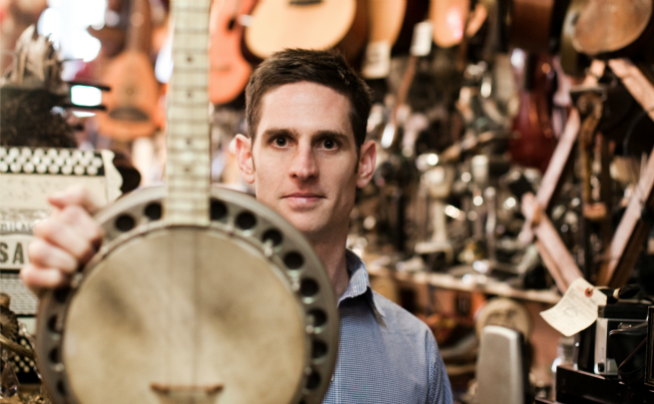Interview: Jayme Stone – Canadian Banjoist Extraordinaire is Coming to Town

Photo by Vanessa Heins
Two-time Juno-winning banjoist and composer Jayme Stone is bringing his most ambitious project yet to Ottawa.
Stone, from Toronto, makes music inspired by folk traditions from around the world. He was once called the “Yo-Yo Ma of the banjo” by the Globe and Mail. Admittedly I know very little about banjo music other than loving its addition to many folk classics. So before the interview I made sure to give him a listen and was blown away by sounds I had never heard resonate from a banjo before. His trips around the world, especially to Africa has clearly made their mark.
Stone’s latest adventure is called the Lomax Project. Focusing on songs collected by folklorist and field recording pioneer Alan Lomax, this collaboratory brings together some of North America’s most distinctive and creative roots musicians to revive, recycle and re-imagine traditional music.
The Lomax Project comes through Ottawa on the NAC’s Fourth Stage on March 16, 2016, more information here. Check out and interview I did with Mr. Stone below:
What drew you to the banjo?
I took it up at 16 years-old. Then I heard Bela Fleck play which really showed my what type of modern things that can be done with the banjo. I also always had a love for the more traditional side of the banjo.
Who are some of your favourite banjo players or biggest influences?
Tony Trischka was huge influence on me. He taught me as well as taught Bela Fleck back in the day. Tony was amazingly forward thinking and really pushed the instrument. Another big influence or one of my favourites is Mike Seeger. Mike is Pete Seeger’s younger half-brother. He is less known, but more studious and an amazing player.
What brought you to Africa in 2007?
I always had my ear to ground and was quite interested in music from other cultures. I had interpreted some music heavily inspired by Mali. I also always knew that the banjo came from an instrument closely related to one from South Africa in the 1700’s. I started playing with a griot, a West African historian, storyteller and musician, named Mansa Sissoko. All these different threads connected and I really wanted to go learn the traditional music of Africa.
How did that trip to Africa influence your music?
I really fell in love with West African music when I was there. I truly absorbed the rhythms and melodies, and they have been with me ever since. The wonderful thing about learning music is that it never goes away. It gets in your bones. African music is certainly a big big influence on me and it is even prevalent in the Lomax project.
What drew you to Alan Lomax?
I started listening to field recordings twenty years ago when I took up the banjo. Alan Lomax is of course one of the most prolific folklorists of the 20th century and this project gave me the chance to dig deeper into his vast archive. I love the diversity of the songs he collected and revel in discovering new sounds, stories, and people through the process.
What can audiences expect to hear?
We play a good many of the songs from the Lomax Project album. On this tour, we’re also debuting fourteen new songs that we’ve unearthed and dusted off from the Lomax archive. Bahamian sea shanties, Georgia Sea Island spirituals, ancient Appalachian ballads, fiddle tunes, and work songs collected from both well-known musicians and everyday folk: sea captains, cowhands, fisherman, prisoners, and homemakers.
What are your all-time favorite albums, and why?
Bill Frisell’s record The Intercontinentals moved me to tears the first time I heard it. It weaves together sounds and people from Brazil, Mali, and America, yet Frisell’s mark is indelibly etched in the music. Marc Johnson’s album, The Sound of Summer Running, set the template for my early records in their melding of improvisation with folksy melodies. The first Remember Shakti album is brilliant. John McLaughlin, Zakir Hussian, and Vikku Vinayakram have some of the deepest chemistry and camaraderie I’ve ever heard. I always come back to Martin Hayes and Dennis Cahill’s album, The Lonesome Touch. It’s perfect music, like Bach.
What’s your hidden talent or claim to fame?
I love handwriting. My bandmates are always saying that I should design a font for people type their sets lists with.
